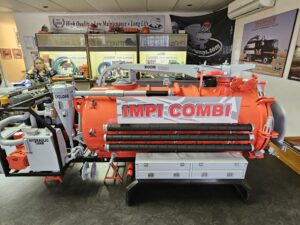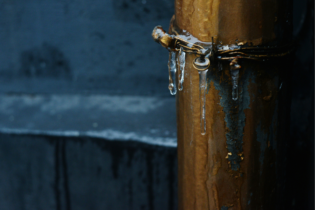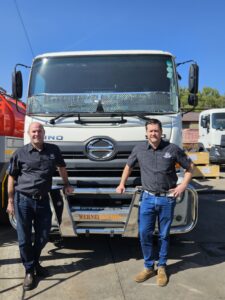 For over 36 years, Werner Pumps has been designing, manufacturing, supplying and maintaining specialist high-pressure jetting equipment, offering locally built units at competitive prices.
For over 36 years, Werner Pumps has been designing, manufacturing, supplying and maintaining specialist high-pressure jetting equipment, offering locally built units at competitive prices.
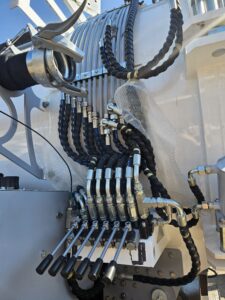 Amanzi Recycling Unit
One such example is Werner Pumps’ African-built Amanzi Recycling Unit that repurposes the water captured when cleaning a sewer or stormwater line through an onboard filtration process. This allows for a more economical and water-conscious pumping process – creating a huge environmental advantage.
“Unlike conventional jetting and vacuuming equipment, the Amanzi Recycler’s jetting tank has an additional recycling component. It therefore only needs to be filled with fresh water just once for the entire day’s operation. By vacuuming and reusing the same water throughout a shift, the system saves up to 165 000 ℓ of clean water during a typical shift, saving millions of litres of water a year,” states George Jolly, Werner Pumps sales manager.
Drain cleaning, for example, requires a large quantity of high-pressure water. Standard vacuum jetting trucks that only have a jetting and suction component have jetting tanks that must be regularly refilled throughout the day.
Amanzi Recycling Unit
One such example is Werner Pumps’ African-built Amanzi Recycling Unit that repurposes the water captured when cleaning a sewer or stormwater line through an onboard filtration process. This allows for a more economical and water-conscious pumping process – creating a huge environmental advantage.
“Unlike conventional jetting and vacuuming equipment, the Amanzi Recycler’s jetting tank has an additional recycling component. It therefore only needs to be filled with fresh water just once for the entire day’s operation. By vacuuming and reusing the same water throughout a shift, the system saves up to 165 000 ℓ of clean water during a typical shift, saving millions of litres of water a year,” states George Jolly, Werner Pumps sales manager.
Drain cleaning, for example, requires a large quantity of high-pressure water. Standard vacuum jetting trucks that only have a jetting and suction component have jetting tanks that must be regularly refilled throughout the day.
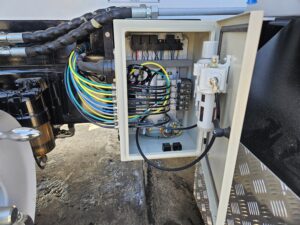 With the Amanzi Recycling Unit, the water recycling system enhances operational efficiencies by eliminating the need for the truck to repeatedly travel between the job site and a water source, meaning that significant savings in fuel, water and overall maintenance costs are achieved. The Werner Amanzi Recycling Unit also provides powerful and efficient vacuum and jetting for industrial sump cleaning, slurry management and drainage system maintenance.
Jolly explains that traditional jetting equipment requires high quality water to avoid accelerated wear of any components. But the Amanzi Recycling Unit has a specialised filtration system built within the tank super structure that separates the solids from the liquids and re-uses the same dirty water vacuumed for its jetting function.
The hydraulic operation of the vacuum and high-pressure pumps also contributes to reduced maintenance requirements, consequently reducing downtime and associated costs. The truck operates hydraulically off a split shaft unit connected to the truck’s drive shaft instead of a V-belt drive. This design ensures that the pump can be operated at low revolutions per minute, resulting in reduced fuel consumption and efficient energy use. Furthermore, the vacuum pump and high-pressure pump are above the chassis and not low to the ground, allowing the vehicle to drive in more areas.
“We have supplied several recycling trucks to contractors working in municipalities and the mining industry. They all appreciate the cost and water savings the truck offers. Furthermore, trucks can be manufactured to different sizes to suit specific client requirements, and the vacuum and jetting pumps can be customised to meet varying demands,” adds Jolly.
Improvements to the Amanzi Recycler
With the Amanzi Recycling Unit, the water recycling system enhances operational efficiencies by eliminating the need for the truck to repeatedly travel between the job site and a water source, meaning that significant savings in fuel, water and overall maintenance costs are achieved. The Werner Amanzi Recycling Unit also provides powerful and efficient vacuum and jetting for industrial sump cleaning, slurry management and drainage system maintenance.
Jolly explains that traditional jetting equipment requires high quality water to avoid accelerated wear of any components. But the Amanzi Recycling Unit has a specialised filtration system built within the tank super structure that separates the solids from the liquids and re-uses the same dirty water vacuumed for its jetting function.
The hydraulic operation of the vacuum and high-pressure pumps also contributes to reduced maintenance requirements, consequently reducing downtime and associated costs. The truck operates hydraulically off a split shaft unit connected to the truck’s drive shaft instead of a V-belt drive. This design ensures that the pump can be operated at low revolutions per minute, resulting in reduced fuel consumption and efficient energy use. Furthermore, the vacuum pump and high-pressure pump are above the chassis and not low to the ground, allowing the vehicle to drive in more areas.
“We have supplied several recycling trucks to contractors working in municipalities and the mining industry. They all appreciate the cost and water savings the truck offers. Furthermore, trucks can be manufactured to different sizes to suit specific client requirements, and the vacuum and jetting pumps can be customised to meet varying demands,” adds Jolly.
Improvements to the Amanzi Recycler
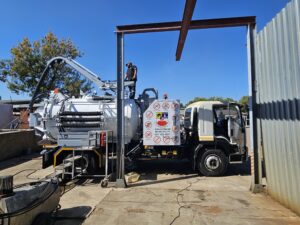 The original imported unit used a 270-degree boom, but Werner pumps has created a 360-degree boom, meaning that cleaning operations are not confined, and can take place in front of and behind the truck.
The original imported unit used a 270-degree boom, but Werner pumps has created a 360-degree boom, meaning that cleaning operations are not confined, and can take place in front of and behind the truck.
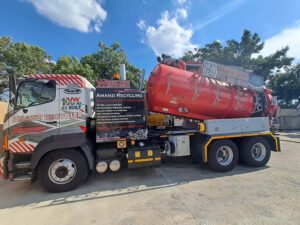 Werner Pumps have a good understanding of the performance of their equipment and are constantly looking at other improvements. This is largely due to insights from their own their rental fleet as well as the aftersales service and support to customers.
“Our customers can take a maintenance plan option. Our equipment should be serviced every 350 hours. A logbook is filled out by our customers and stamped by us once serviced. We also capture all work done on our equipment for future reference,” states Werner.
He adds that Werner Pumps has a service fleet of vehicles that can be sent out to customers in the field when there are electrical or mechanical faults. “Our technicians know our equipment inside and out as they’ve helped to put these trucks together at our factory. They do their best to diagnose and fix problems onsite, and if they can’t resolve the issue, they will assist the customer to get the truck back to our premises.”
“We do not outsource our electrical components, they are manufactured inhouse. Therefore, if there is a fault, we are the best company to fix it and it also means that we can get equipment up and running with minimal downtime,” he continues.
The decision to create a service and repair fleet is based on the company’s constant drive to solve customer’s challenges, remove frustrations and provide a one-stop shop. “We’re always asking our customers what they want and need, and then we try to deliver that. It’s one of the reasons we manufacture our equipment locally – so we can customise it to customers’ specific requirements,” says Werner.
However, all equipment is manufactured to make maintenance as easy as possible. When a company purchases any new equipment, Werner Pumps oftens train the operators to service the equipment themselves.
Werner Pumps have recently added another unit to their rental fleet. Initially, the rental fleet was used to provide a buying customer with equipment while their order was being built, but some of Werner Pumps’ customers rent equipment for a duration of a contract. According to Werner, their rentals, often produce sales once the equipment is seen in action.
“Most times, our own trained operators and assistants will drive and utilise the equipment for the duration of that contracts and their services will be included in the rental agreement. They are fully trained with regards to health and safety protocols. We also do site surveys, scope of work, risk assessments and event route plans. Health and safety is a huge priority and we design all of our equipment accordingly.”
“We believe that the reason we have repeat customers is the fact that we give our customers what they need to support their businesses,” he concludes.
Werner Pumps have a good understanding of the performance of their equipment and are constantly looking at other improvements. This is largely due to insights from their own their rental fleet as well as the aftersales service and support to customers.
“Our customers can take a maintenance plan option. Our equipment should be serviced every 350 hours. A logbook is filled out by our customers and stamped by us once serviced. We also capture all work done on our equipment for future reference,” states Werner.
He adds that Werner Pumps has a service fleet of vehicles that can be sent out to customers in the field when there are electrical or mechanical faults. “Our technicians know our equipment inside and out as they’ve helped to put these trucks together at our factory. They do their best to diagnose and fix problems onsite, and if they can’t resolve the issue, they will assist the customer to get the truck back to our premises.”
“We do not outsource our electrical components, they are manufactured inhouse. Therefore, if there is a fault, we are the best company to fix it and it also means that we can get equipment up and running with minimal downtime,” he continues.
The decision to create a service and repair fleet is based on the company’s constant drive to solve customer’s challenges, remove frustrations and provide a one-stop shop. “We’re always asking our customers what they want and need, and then we try to deliver that. It’s one of the reasons we manufacture our equipment locally – so we can customise it to customers’ specific requirements,” says Werner.
However, all equipment is manufactured to make maintenance as easy as possible. When a company purchases any new equipment, Werner Pumps oftens train the operators to service the equipment themselves.
Werner Pumps have recently added another unit to their rental fleet. Initially, the rental fleet was used to provide a buying customer with equipment while their order was being built, but some of Werner Pumps’ customers rent equipment for a duration of a contract. According to Werner, their rentals, often produce sales once the equipment is seen in action.
“Most times, our own trained operators and assistants will drive and utilise the equipment for the duration of that contracts and their services will be included in the rental agreement. They are fully trained with regards to health and safety protocols. We also do site surveys, scope of work, risk assessments and event route plans. Health and safety is a huge priority and we design all of our equipment accordingly.”
“We believe that the reason we have repeat customers is the fact that we give our customers what they need to support their businesses,” he concludes.


